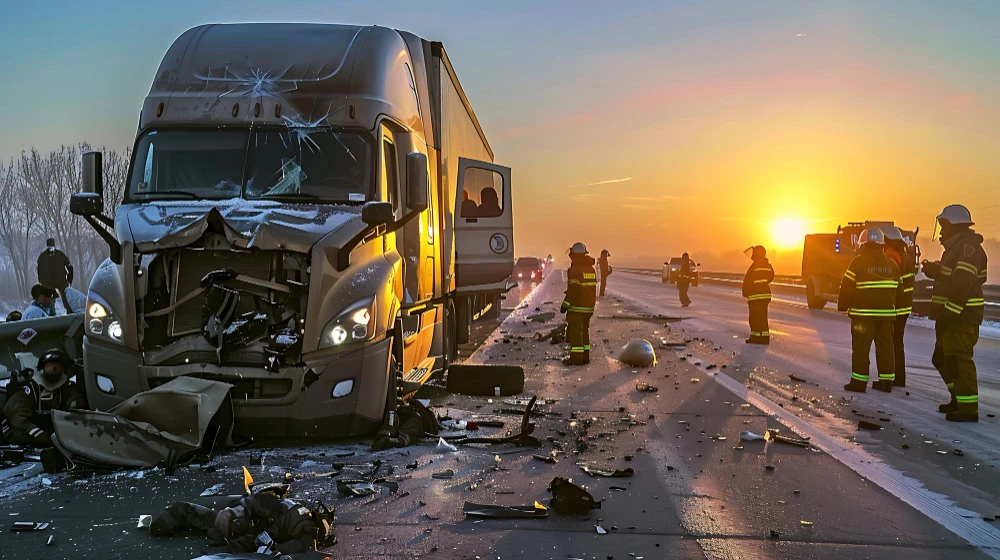Involved in a Truck Accident? A Complete Guide to Truck Accident Cases
Truck accidents may be extremely harmful, frequently leading to serious injuries, substantial property damage, and even fatalities. The sheer size and weight of commercial trucks mean that collisions with smaller vehicles can have catastrophic consequences.
If you or a loved one has been involved in a truck accident, understanding the legal processes involving semi truck accident lawyer and steps to take can help you navigate this challenging time.
This complete truck accident guide will provide you with essential information about truck accident cases, including what to do immediately after an accident, determining liability, the role of insurance companies, and seeking compensation.
What to Do Right Away Following a Truck Accident
1. Ensure Safety and Seek Medical Attention
Move to a safe location and assess for injuries if possible. To report the accident and ask for medical aid, dial 911. Even if injuries seem minor, it is crucial to seek medical attention as some symptoms may not appear immediately.
2. Contact Law Enforcement
A police report is necessary for any kind of legal action or insurance claim. The police will take official reports, record the scene, and interview witnesses. Make sure you obtain the responding officers’ names and badge numbers.
3. Gather Evidence
Take as much evidence from the accident scene as you can, if it’s safe to do so. This includes taking photos of the vehicles, road conditions, any visible injuries, and other relevant details. Collect contact information from witnesses and note the truck driver’s information, including their employer and insurance details.

4. Avoid Admitting Fault
Use caution when speaking at the scene. Steer clear of statements that could be construed as an admission of fault. Stick to the facts when discussing the accident with law enforcement and other parties involved.
Determining Liability in Truck Accidents
1. Understanding Fault
Liability in truck accidents can be complicated and involve several parties. These parties may include the truck driver, the trucking company, the vehicle manufacturer, or even the party responsible for maintaining the truck. Each case is unique, and thorough investigation is needed to establish fault.
2. Truck Driver
If the truck driver broke any traffic laws or was careless, they might be held accountable. Common causes of driver negligence include speeding, distracted driving, fatigue, and driving under the influence of drugs or alcohol.
3. Trucking Company
Trucking companies may be held responsible if they failed to maintain the truck properly, hired unqualified drivers, or violated hours-of-service regulations designed to prevent driver fatigue.
4. Vehicle Manufacturer
If a defect in the truck or its components caused the accident, the manufacturer might be held liable. This covers problems with the tires, brakes, and other important systems.
5. Maintenance Provider
Companies responsible for maintaining the truck can be liable if poor maintenance practices contributed to the accident. This includes failing to perform regular inspections or ignoring known issues.
The Role of Insurance Companies
1. Dealing with Insurance Adjusters
Following a truck accident, insurance adjusters who work for the trucking firm or other affected parties will probably get in touch with you. It is crucial to be cautious in these interactions. Insurance adjusters may attempt to minimize the payout or shift blame.
2. Document Everything
Maintain thorough records of all correspondence—including emails, letters, and phone conversations—with insurance companies. Document your medical treatment and expenses, property damage, and any other costs related to the accident.
3. Avoid Quick Settlements
Insurance companies may offer quick settlements to close the case rapidly. These initial offers are often low and may not cover all your expenses. Before taking any settlement, speak with a lawyer to be sure you’re getting paid fairly.
Seeking Compensation
1. Types of Compensation
Truck accident victims may be eligible for a number of compensation options, such as:
- Medical Expenses: Covers current and future medical bills related to the accident.
- Lost Wages: Make-up for lost earnings as a result of accidents.
- Pain & Suffering: Offers recompense for both mental and physical suffering.
- Property Damage: Covers the repair or replacement of damaged property.
- Punitive Damages: These may be awarded in circumstances of outrageous carelessness in order to penalize the guilty party and discourage future incidents of the same kind.
2. Filing a Lawsuit
If negotiations with insurance companies do not result in a fair settlement, you may need to file a lawsuit. An experienced truck accident lawyer can guide you through this process, gather evidence, build a strong case, and represent you in court.
Why You Need a Truck Accident Lawyer
Due to the complexity of truck accident cases, experts in state and federal laws pertaining to the trucking sector are needed. A knowledgeable attorney can guide you through these difficulties, defend your rights, and make sure you get paid what you are due. They can handle negotiations with insurance companies, gather critical evidence, and provide expert legal advice.
Connect with Mokaram Law Firm!
Being involved in a truck accident is a traumatic experience that can have long-lasting physical, emotional, and financial impacts. Understanding the steps to take immediately after the accident, how to determine liability, and the importance of seeking fair compensation is crucial for your recovery and peace of mind.
At Mokaram Law Firm, we are committed to helping victims of truck accidents navigate the legal process and achieve the justice they deserve. Our experienced team of truck accident lawyers will work tirelessly to protect your rights and secure the maximum compensation for your injuries and losses. Call Mokaram Law Firm right now to schedule a free consultation. Call us at (281) 609-9224 to schedule your appointment and learn how we can assist you in your recovery journey.
Recent Posts
-
 30 Jan 2025Washington, D.C. Plane Crash: Investigation Underway Following Collision with Black Hawk Helicopter
30 Jan 2025Washington, D.C. Plane Crash: Investigation Underway Following Collision with Black Hawk Helicopter -
 22 Jan 2025How Do People Who Text and Drive Get Punished in Different States?
22 Jan 2025How Do People Who Text and Drive Get Punished in Different States? -
 22 Jan 2025Do Pedestrians Have the Right of Way?
22 Jan 2025Do Pedestrians Have the Right of Way? -
 20 Jan 2025Are Radar Detectors Legal? Everything You Need to Know About Radar Detector Laws
20 Jan 2025Are Radar Detectors Legal? Everything You Need to Know About Radar Detector Laws -
 20 Jan 2025What Age Can You Get Your Driver's License in Texas?
20 Jan 2025What Age Can You Get Your Driver's License in Texas? -
 07 Jan 2025Legal Help for Families Affected by Jeju Air Flight 2216
07 Jan 2025Legal Help for Families Affected by Jeju Air Flight 2216 -
 17 Dec 2024Is Lane Splitting Legal in Texas?
17 Dec 2024Is Lane Splitting Legal in Texas? -
 17 Dec 2024Can Police Write Tickets in a Car Accident? | Legal Insights
17 Dec 2024Can Police Write Tickets in a Car Accident? | Legal Insights -
 01 Dec 2024What is the Minimum Age to Get a Tattoo in the USA?
01 Dec 2024What is the Minimum Age to Get a Tattoo in the USA? -
 29 Nov 2024Is It Really Illegal to Drive Barefoot? Debunking Common Myths
29 Nov 2024Is It Really Illegal to Drive Barefoot? Debunking Common Myths -
 29 Nov 2024Is It Illegal to Get Someone Drunk?
29 Nov 2024Is It Illegal to Get Someone Drunk? -
 29 Nov 2024Is it Illegal to Drive With Headphones? Understanding the Risks and Laws
29 Nov 2024Is it Illegal to Drive With Headphones? Understanding the Risks and Laws
